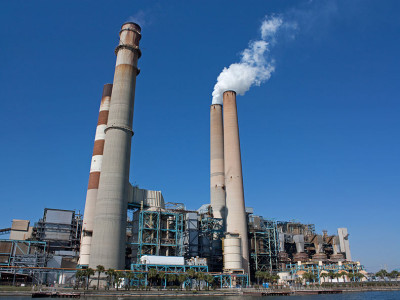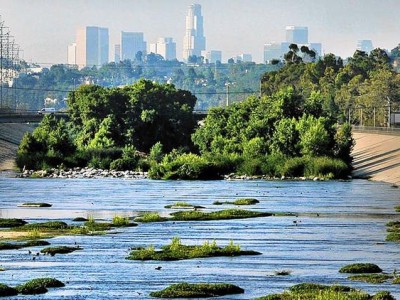Obama’s Clean Air Act 111d Rules Are Legally Required, Not an End Run Around Congress
Massachusetts v. EPA triggered the President's Action
On Monday, President Obama is expected to release proposed regulations to cut carbon emissions from existing power plants. Leaks to date suggest that the rules, which will cover 40 percent of total U.S. greenhouse gas emissions, will be ambitious and far-reaching, requiring cuts of approximately 20 percent from the electricity sector. We can already anticipate outcries from Congressional Republicans and opponents of any carbon regulations that the President is engag...
CONTINUE READINGGuest Blogger Kate Konschnik: EPA’s 111(d) Authority – Follow Homer and Avoid the Sirens
Kate Konschnik is the Director of Harvard Law School's Environmental Policy Initiative. The views expressed in this blog post are her own. Thirty years ago, Chevron v. NRDC set the standard for judicial deference to an agency’s statutory interpretation. In that case, the Supreme Court upheld EPA’s interpretation of Clean Air Act language. This month, Chevron headlined in yet another Supreme Court case to consider – and defer to – EPA’s implementation of thi...
CONTINUE READINGThe Los Angeles River and GOP Ideology: Everybody Wins!
A few years ago, I heard Bruce Babbitt here at UCLA describe the U.S. Army Corps of Engineers as "just a terrible agency." Then he repeated it, just to make sure that we all heard him. When a politician does something like that, you know that he's reached the end of his rope. The Los Angeles Times suggests that the Corps is at it again. Los Angeles Mayor Eric Garcetti is in Washington DC attempting to get the Army to approve a $1 billion restoration of the Los A...
CONTINUE READINGReassuringly Stupid
The House GOP' is trying to stop the Pentagon from thinking about climate change. Here's why it won't work.
The military considers climate change to be a threat to national security. Naturally, that's news that the House Republicans would like to suppress. Last week, they tried to do something about it with an appropriations rider. Luckily, the amendment is so poorly drafted that it would accomplish almost nothing. Here's the language of the amendment: None of the funds authorized to be appropriated or otherwise made available by this Act may be used to implement the ...
CONTINUE READINGInsurance for Climate Disasters
Nobel-prize winning economist Robert Schiller has a New York Times op-ed about the need for insurance against risks of climate change. Speaking of the latest U.S. climate assessment, he writes: After discussing how to mitigate the coming dangers, the report says, “Commercially available mechanisms such as insurance can also play a role in providing protection against losses due to climate change.” That sentence should have been in big, bold letters and underlin...
CONTINUE READINGFeds Downgrade Monterey Shale Oil Reserves by 95.6%
LA Times op-ed highlights increase in trains transporting oil into California
The U.S. Energy Information Administration (EIA) is reducing its previous estimate for technically recoverable oil in California's Monterey Shale from 13.7 billion barrels of oil to just 600 million barrels of oil—a dramatic 95.6 percent reduction. Has the oil industry been chasing rainbows in search of illusive "black gold" Monterey oil? For years, the oil industry has made extensive claims about the job and economic benefits that will come from developing the Mont...
CONTINUE READINGCan Behavioral Economics Be Saved?
Statistical Manipulation Has Led To Embarrassing Results, But the Field Is Working Hard to Maintain Integrity
You might think that's a funny question, because it is all the rage now in academia. Last month's Harvard Law Review featured an article by Ryan Bubb & Richard Pildes arguing that behavioral economics does not go far enough. But an article in this month's Pacific Standard by Jerry Adler reveals a growing problem with its experimental data. (Pacific Standard is an outstanding magazine, by the way: you should read it). The problem has become so rampant in behaviora...
CONTINUE READINGWhat Beijing Could Learn From George Washington
But It Seems More Interested in Following John Roberts
Alex's terrific op-ed raises two key questions, one snide and disturbing, the other more profound. As for the first, I couldn't help notice this point in the middle of his piece: Courts often refuse to even accept difficult or sensitive cases. The Supreme People’s Court has adopted rules for breaking up class-action lawsuits and relegating individual suits to co-opted lower-level courts. Citizens are therefore often unable to use the law against polluters, especial...
CONTINUE READINGChina’s Pollution Challenge
Can a new law save China's environment?
Benjamin van Rooij and I published the following in the New York Times op-ed page today. In short, it is about the challenges the new Environmental Protection Law will face in practice and the critical reforms needed to overcome these challenges: China’s national legislature has adopted sweeping changes to the country’s Environmental Protection Law, revisions that have been hailed as major steps toward saving China’s environment from rampant degradation. The au...
CONTINUE READINGOf Corn and Climate
Trouble may be brewing in the corn belt.
We continue to gain a better understanding of the impacts of climate change, which are sometimes subtle and unexpected. Two articles in Science report significant new research. The first report comes from two researchers at the University of Illinois. Corn, like other plants, needs to pull CO2 from the air for photosynthesis. But the same tiny pores in leaves that allow the CO2 to come in also allow water to evaporate and get out. In warmer weather, evaporat...
CONTINUE READING











